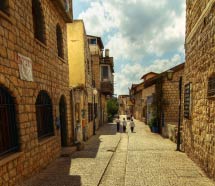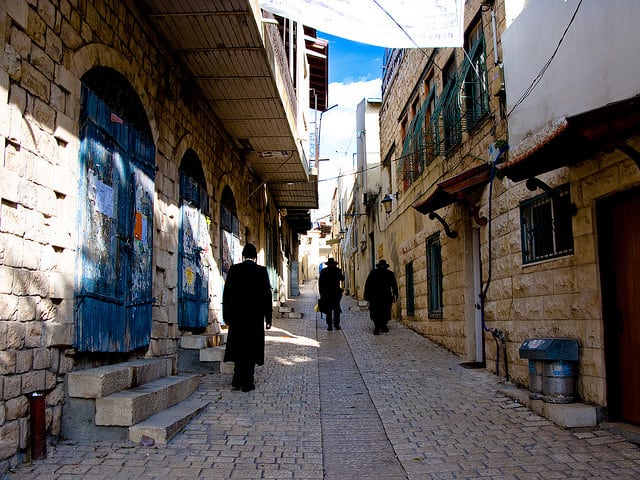
Eretz Yisrael is a very holy place. However, there are four cities that are singled out as exceptionally holy, and which are imbued with special qualities. With Hashem’s help, I have visited all four, if only for a short time. The cities are Chevron, Yerushalayim, Tiberius and Tzfat. Each of these cities is associated with a particular kind of holiness, corresponding to the four “basic elements.” Yerushalayim – fire; Chevron – earth; Tiberius – water; and, my favorite, Tzfat – air.
Why is Tzfat my favorite? After all, Yerushalayim was home to the Beit HaMikdash, and the Kotel is accessible to us even to this day. The matriarchs and patriarchs are buried in Hebron. Tiberius housed the last seat of the great Sanhedrin and is the burial place of the Rambam.
I can say, without reservation, though, that Tzfat is the most beautiful and spiritual place that I have ever encountered. The stone streets with the drainage depressions down the middle, the beautiful ancient architecture, and the ubiquitous blue building walls are all stunning. But it’s not just Tzfat itself. It is also the view, that beautiful view of the mountains. And the sunsets. It’s easy to see why kabbalah and mysticism began and developed here. There is something very special about the air. The holiness of the air of Tzfat is palpable. You can stand in the center of town, surrounded by noise and sights and smells, and still breathe in the holiness. You can tune everything else out.
In 1997, I visited Israel for the second time. At that point in my life, I was on what I call the cusp of becoming frum. I was taking it very slowly, which is the best way. I had just bought a place in a largely Jewish neighborhood back home, feeling that if I were to move forward in my Yiddishkeit, I would want and need support.
I stayed with a friend in the city of Rechovot, and rented a car for the duration of my three-week stay in Israel. Many, many people – Israeli and American – thought that I was out of my mind for driving in Israel, but I like my independence.
One day, I drove to Tzfat – not an insignificant trek – and stayed in the nicest hotel in the city, figuring that since I was paying nothing to stay with my friend in Rechovot, I would treat myself. It was Shabbos, and I was watching television in my room. I even remember what I was watching.
Dinner time arrived and I was hungry. However, the dining room was filled with families, and I felt self-conscious sitting by myself. I went back to my room and planned to order room service. The problem: the only thing that the hotel would deliver to my room was chocolate cake. Why, I don’t know. This is not ordinarily a problem; I like chocolate cake as much as the next person. But I wanted a real dinner. So I decided to drive to a nearby city, one with, unlike Tzfat, eating establishments that would be open despite it being Shabbos. Now, in addition to being the most beautiful city in the world, Tzfat is the most confusing city in the world. I drove around and around, out of the old city and into the new, all the while twelve year old boys yelling at me for driving on Shabbos. It felt like I was in the eye of a storm.
Finally, I was out of Tzfat. Since Tzfat is located way up on the top of a mountain, the drive down is quite precarious. There are no street lights and no guard rails. But I was determined to get dinner.
All of the sudden, my engine cut out. Nothing worked. Nothing. No brakes, no motor, no power steering. I was rolling down a mountain, helpless. Almost reflexively, straight from my soul, I said, “G-d, if you save me, I will keep your Sabbath.” And somehow, I’m not sure why, I wasn’t scared. If Hashem chose not to save me, I believed that there was a reason for that. I tried to steer uphill, without the power steering. Nothing. Not knowing what to do, I turned the engine off, and then turned it on again and hoped for the best.
The engine started working. My life was no longer in danger. Hashem had clearly intervened in a very open and miraculous way – it was Hashgacha Pratis at its best. He quite literally saved my physical life – and my spiritual life as well. We often miss smaller moments of intervention in our everyday lives, but you couldn’t miss this. There was clearly a sign here, an open miracle, and it changed my life forever.
I gave up on my quest for dinner. I went back to the hotel and had my chocolate cake. It was the best chocolate cake that I had ever eaten.
The screaming boys were right – I needed to keep Shabbos, and I have done so since my return to the States a couple of weeks after this experience.
There is truly something in the air in Tzfat.
© 2009 Donna Gorshel Cohen
Donna (Temima) Gorshel Cohen, grew up in a suburb of Boston. Although she always had a strong Jewish identity, she didn’t become “frum” until her 30s. She is married to a wonderful man and has a fabulous 8-year-old son. She is a “recovering” lawyer, hoping, with Hashem’s help, to switch to a career in writing/editing/publishing. She has just finished editing the memoirs of a Holocaust survivor.
The words of this author reflect his/her own opinions and do not necessarily represent the official position of the Orthodox Union.



